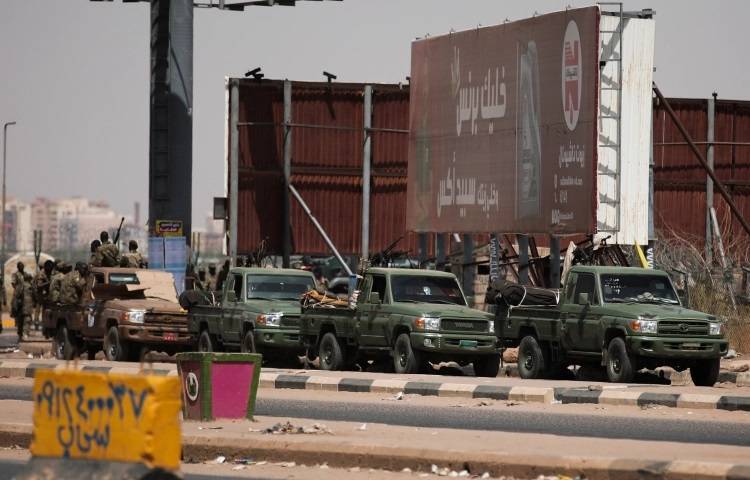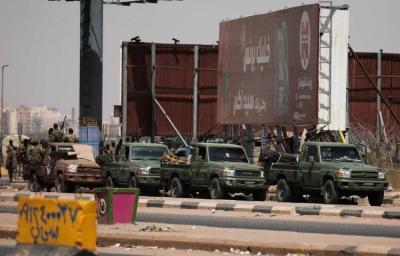The statement from the Sudanese Ministry of Defense today, Friday, has raised fears of a potential expansion of the fighting, especially after a call for retired soldiers to head to the nearest military command for arming themselves "to ensure their safety." This suggests a possibility of chaos in the streets and the inability of official bodies to maintain order and manage events.
Scattered clashes continue between the Sudanese army and the Rapid Support Forces, exacerbating the risk of the collapse of a week-long international ceasefire amid growing concerns about a humanitarian crisis. Army Commander Abdel Fattah al-Burhan has called on the United Nations to change its envoy to Sudan, Volker Perthes, considering that the latter has encouraged Rapid Support Forces Commander Mohamed Hamdan Dagalo, known as Hemeti, to rebel. Two military sources informed Reuters today that the Sudanese army seized weapons and ammunition smuggled from a foreign country. They indicated that the military intelligence division noticed the activity of a group involved in arms smuggling in the Red Sea state, working to bring weapons and ammunition into eastern areas and deliver them to the rebels.
In a joint statement today, the U.S. embassy in Khartoum confirmed that "Saudi Arabia and the United States are noticing an improvement in respect for the short-term ceasefire agreement and humanitarian arrangements in Sudan."
In a statement released today, the Sudanese Ministry of Defense urged retired soldiers to bear arms and head to the nearest military command for arming themselves. However, it clarified later that this summons is aimed at "officers, non-commissioned officers, and retired soldiers of the armed forces" for them to present themselves to the nearest military unit. A military spokesperson mentioned that the call would be voluntary. However, the current Sudanese Armed Forces law stipulates that retired soldiers remain on reserve lists, making them subject to compelled summons to rejoin the army.
The ceasefire, monitored by Saudi Arabia and the United States, was reached after five weeks of fighting in Khartoum, which sparked violence and looting in other parts of Sudan, including the western region of Darfur. The fighting between the army and the Rapid Support Forces has worsened the humanitarian crisis, forcing over 1.3 million people to flee their homes and threatening to destabilize a region already in a precarious situation. The U.S. State Department stated that the "monitoring mechanism for the ceasefire in Sudan has detected potential violations of the agreement, including the use of artillery, warplanes, and drones." Washington has also warned that the Russian Wagner military group is supplying the Rapid Support Forces with surface-to-air missiles to combat the Sudanese army, saying it "contributes to a prolonged armed conflict that will only lead to further chaos in the region."
The army, led by Lieutenant General Abdel Fattah al-Burhan, relies on aerial power while the Rapid Support Forces, led by Mohamed Hamdan Dagalo (Hemeti), have taken to the streets of Khartoum for protection. It remains unclear how much progress either side has made over the past few weeks. Residents reported clashes between the two sides occurred yesterday in Khartoum, the neighboring city of Omdurman, and the strategic city of Al-Obeid to the southwest.
UNHCR coordinator Toby Howard stated that "an armed group has besieged the city of Zalingei, the capital of Central Darfur". He added, "telecommunications have been cut off, and gangs on motorcycles have attacked hospitals, government offices, relief organization offices, and homes." The same situation occurred in the city of Geneina, the capital of West Darfur, where communications have been cut off from residents for several days following the killing of around 510 people.
The agreement for a ceasefire was reached last Saturday after talks in Jeddah facilitated by Saudi Arabia and the United States. Previous ceasefire agreements have failed to end the fighting. Over a million people have been displaced within Sudan, and 319,000 have fled to neighboring countries, some of which are already struggling with poverty and similar histories of internal conflicts.
When war swept through the Sudanese capital last month, it quickly spread to the Darfur region in the west, igniting an old conflict and sending a wave of refugees across the border into Chad. Residents attribute the renewed violence in Geneina and other parts of Darfur to the power struggle between the Sudanese army and the Rapid Support Forces in Khartoum, allowing militias to operate in the area without restraint.
Those interviewed by Reuters indicated that the attacks in Geneina since late April were carried out by the "Janjaweed" militia, which includes fighters commonly believed to belong to nomadic Arab tribes using trucks, motorcycles, and horses, the same militias that formed the basis of the Rapid Support Forces. The Rapid Support Forces deny inciting violence in Darfur and blame the army. Witnesses reported that attacks in Geneina destroyed its markets, electrical network, and medical facilities, recalling memories of the brutal violence that erupted in the early 2000s.
The Sudanese Ministry of Health noted that up to 510 people have been killed in the city, which has a population of around half a million, with at least 250,000 people displaced internally in West Darfur, while 90,000 others have fled to Chad. With communications in Geneina now cut, Abdullah's testimony provided a rare glimpse into the chaos. He said, "Heavy weapons and machine guns fire everywhere. When you go out in the morning, you see new bullet holes in the walls." He added that water supplies have been cut off and that food is scarce in the city he left.




